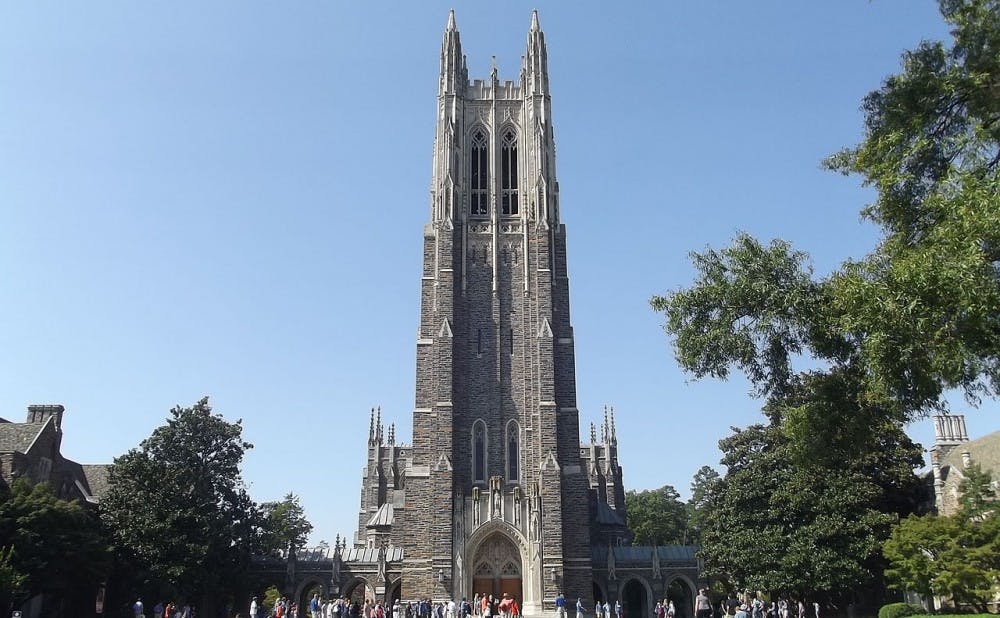This story was updated at 5:38 p.m. Thursday with comments from Christy Lohr Sapp, associate dean of religious life, and updated information on the location of Friday's call-to-prayer from Duke News. It was updated again at 9:03 p.m. with comments from students and once more at 11:54 p.m. with updated information from Michael Schoenfeld.
Two days after Duke announced it would begin a weekly call-to-prayer from the Duke Chapel for Muslim members of the community, the University has reversed its decision.
The University announced Thursday that the first weekly call-to-prayer would not be held from the Chapel bell tower Friday as planned. Members of the Muslim community will now hold the call-to-prayer on the quadrangle in front of the Chapel.
“Duke remains committed to fostering an inclusive, tolerant and welcoming campus for all of its students,” Michael Schoenfeld, vice president for public affairs and government relations, said in the announcement. “However, it was clear that what was conceived as an effort to unify was not having the intended effect.”
The call-to-prayer, known as the adhan, announces the start of a weekly jummah prayer service that has been held in the Chapel basement for several years. The University announced Tuesday that it would now be led by members of Duke's Muslim Students Association, who would lead the chant from the Chapel's bell tower.
"The administration had concerns that precipitated the decision," Christy Lohr Sapp, associate dean for religious life, said.
Potential safety threats were responsible in part for the relocation of the adhan, Schoenfeld said.
"The University was made aware of serious and credible safety concerns and has increased security to address those concerns and protect students and the campus," he wrote in an email Thursday.
Sapp had worked with members of MSA to organize the call-to-prayer and said that many students were excited, viewing the chance to use the Chapel's bell tower as a meaningful step.
"They were elated and grateful for this opportunity, and really felt that it spoke to them being welcomed here at Duke and feeling that Duke valued their presence," Sapp said of the students in MSA.
Some of the University's Muslim students expressed dissatisfaction with the administration's decision.
"When I first found out, I was really shocked. I didn’t expect this of Duke," said sophomore Sophia Aliza Jamal, who is Muslim, adding that she hopes the situation can create constructive dialogue on campus.
Sapp said she was informed of the decision's reversal at approximately 3 p.m. Thursday. The University sent an initial press release at 3:42 p.m, announcing that the call-to-prayer would not be held in the Chapel's bell tower and issued a revised release shortly before 5 p.m., with the information that the call-to-prayer would now be held on the Chapel quadrangle.
"The administration takes a much broader view of the University and University life and sees things from perspectives that those of us kind of on the ground in the midst of the University might not see in the same way," Sapp said. "They're answerable to a different level... the Trustees, relationships with the medical center, relationships with alumni, they have that to deal with in a way that we don't."
Though a number of members of the Duke community had expressed support for the decision to hold the call-to-prayer from the bell tower, the University also received criticism—perhaps most notably from Franklin Graham, son of the Rev. Billy Graham and president and CEO of the Billy Graham Evangelistic Association, who made a Facebook post this morning calling on Duke donors and alumni to withhold support until Duke reversed the decision.
More than 700 of Duke’s 15,000 undergraduate and graduate students identify as Muslim, according to figures provided by Duke News.
"I am very grateful to the Duke administration and the Duke students who did support the [adhan] being announced," said junior Nourhan Elsayed, who is Muslim. "I really hope that we as an academic community, however, can reflect on how to eliminate islamophobia, and all types of racism from our time at Duke and ultimately from our lives. "
Check back for updates on this developing story.
Get The Chronicle straight to your inbox
Signup for our weekly newsletter. Cancel at any time.

